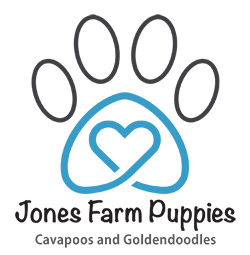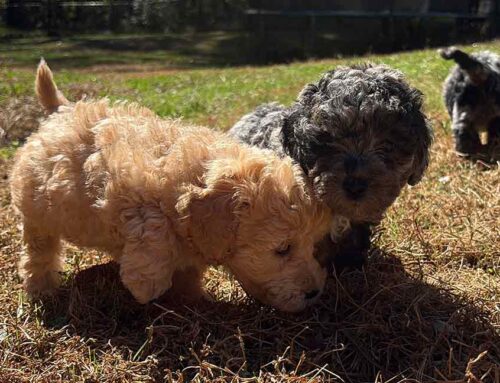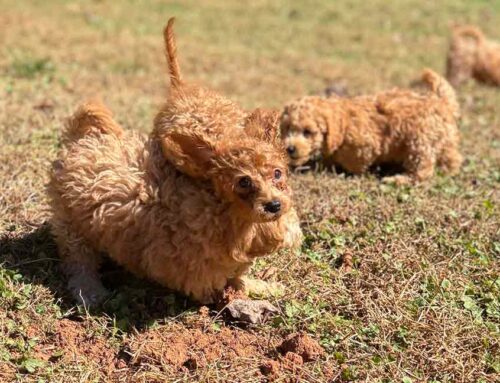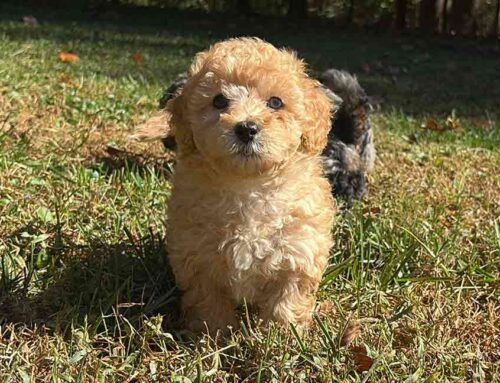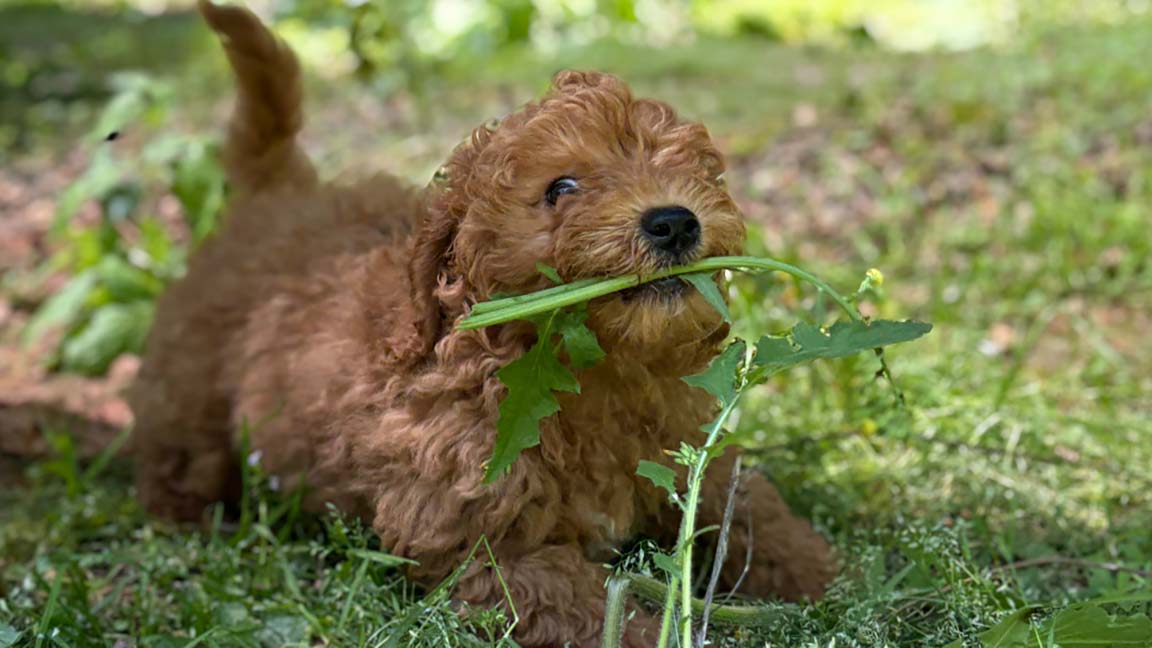
Why Do Dogs Eat Grass: A Breeder’s Complete Guide
Have you ever watched your beloved Cavapoo munching on grass during your morning walk and wondered if this behavior is normal? As an ethical Cavapoo breeder with years of experience raising healthy, happy puppies in clean and loving environments, I can assure you that grass eating is one of the most common and typically harmless behaviors we observe in dogs. This comprehensive guide will help you understand exactly why dogs eat grass, when to be concerned, and how to manage this natural behavior in your furry family member.
The simple answer is that dogs eat grass for multiple reasons, including instinctual behavior inherited from their wild ancestors, nutritional needs, boredom, anxiety, and sometimes just because they enjoy the taste and texture. Unlike the common myth that dogs only eat grass when they feel sick, research shows that less than 25% of dogs vomit after eating grass, and only about 10% show signs of illness beforehand.
At Jones Farm Puppies, we have observed this behavior in countless Cavapoos throughout their development from puppyhood to adulthood. Through our health testing protocols and comprehensive health guarantees, we ensure that our puppies are healthy and exhibit normal behaviors, including occasional grass eating. Our guide will provide you with expert insights from our breeding experience, helping you distinguish between normal grass eating and potential concerns that might require veterinary attention.
The Science Behind Why Dogs Eat Grass
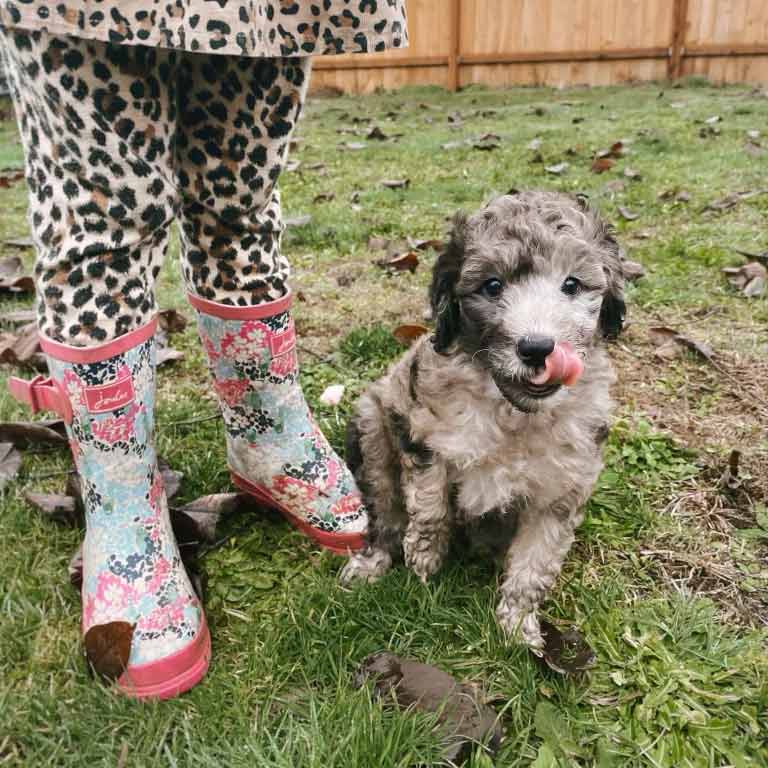 Understanding why dogs eat grass requires us to look at both evolutionary biology and modern canine behavior research. Dogs descended from wolves, and studies of wild wolf populations reveal fascinating insights about plant consumption in canids. Research indicates that between 2% and 47% of wolf stomach contents contain plant material, with grass being a significant component.
Understanding why dogs eat grass requires us to look at both evolutionary biology and modern canine behavior research. Dogs descended from wolves, and studies of wild wolf populations reveal fascinating insights about plant consumption in canids. Research indicates that between 2% and 47% of wolf stomach contents contain plant material, with grass being a significant component.
The evolutionary perspective suggests that grass eating served essential survival functions for wild canids. When prey was scarce, wolves would supplement their diet by directly consuming grasses and other vegetation. This behavior provided essential fiber, aided in digestion, and helped maintain gut health during challenging periods.
Modern domestic dogs retain many of these ancestral instincts despite thousands of years of selective breeding. Even though our Cavapoos receive nutritionally complete commercial diets, they may still feel compelled to seek out grass as part of their natural behavioral repertoire.
From a physiological standpoint, grass provides dietary fiber that can benefit digestive health. While dogs cannot fully digest cellulose like ruminant animals, the fiber content in grass can help promote healthy bowel movements and support beneficial gut bacteria.
Nutritional Factors and Dietary Needs
One of the most scientifically supported reasons for grass eating relates to nutritional needs, particularly fiber deficiency. A landmark case study documented an 11-year-old Miniature Poodle with a seven-year history of eating plants and grass, followed by vomiting. When veterinarians placed this dog on a high fiber commercial diet, the grass-eating behavior completely resolved.
This case highlights an important principle that we apply in our breeding program at Jones Farm Puppies. Proper nutrition from puppyhood through adulthood plays a crucial role in preventing problematic behaviors, including excessive grass eating.
Key nutritional factors include:
- Fiber requirements: Dogs need adequate fiber for healthy digestion
- Individual needs: Cavapoos may have unique dietary requirements based on their genetics
- Quality diet: A natural, balanced diet is essential. We recommend PawTree, an all-natural food line tailored to your dog’s unique needs, formulated to support optimal health without fillers, by-products, or artificial ingredients.
- Supplements: Some dogs may benefit from additional fiber sources
However, it is essential to note that not all grass-eating stems from nutritional deficiencies. Many dogs on perfectly balanced, high-quality diets still engage in this behavior.
Psychological and Behavioral Motivations
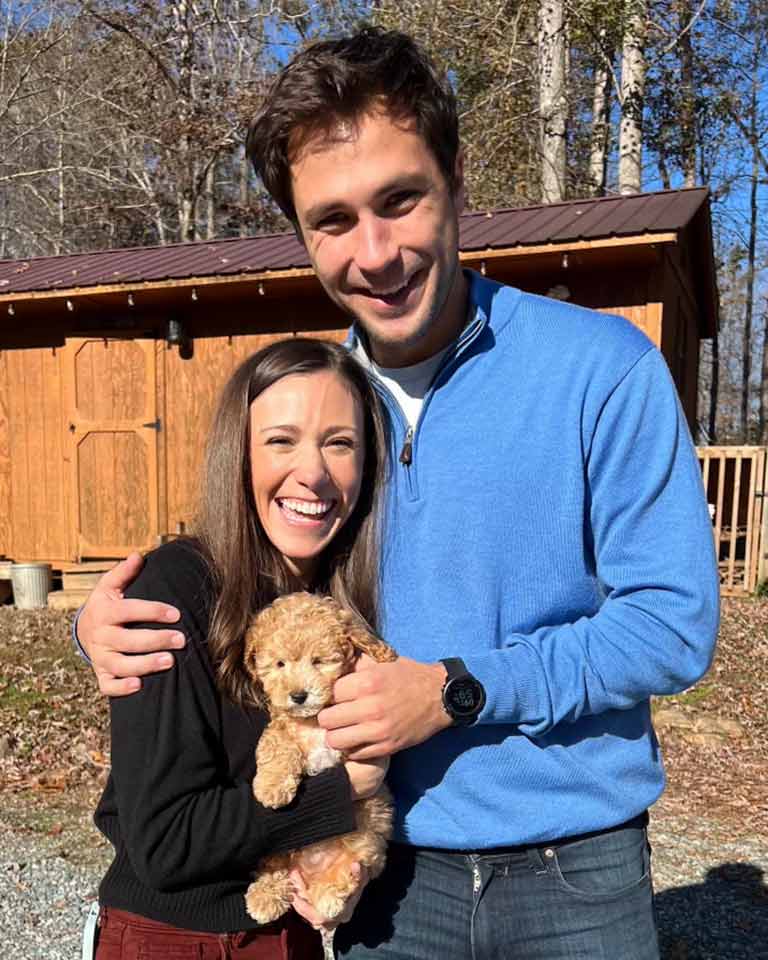 Beyond nutritional factors, grass eating often serves essential psychological functions for dogs. Understanding these motivations helps owners respond appropriately to their Cavapoo’s behavior.
Beyond nutritional factors, grass eating often serves essential psychological functions for dogs. Understanding these motivations helps owners respond appropriately to their Cavapoo’s behavior.
Common psychological reasons include:
- Boredom: Intelligent breeds like Cavapoos require substantial mental stimulation.
- Anxiety: Stress can trigger repetitive behaviors like grass eating.
- Exploration: Young dogs naturally investigate different textures and tastes.
- Attention seeking: Some dogs learn that grass eating gets their owner’s attention.
- Comfort mechanism: Similar to how humans might bite their nails when nervous.
During my years of breeding Cavapoos, I have observed that puppies and young dogs are especially prone to eating grass. Their natural curiosity drives them to investigate different textures, tastes, and smells in their environment.
At Jones Farm Puppies, we prioritize early socialization and stress reduction techniques to help our puppies develop into confident, well-adjusted adults. Our clean, loving environment provides puppies with positive early experiences that reduce the likelihood of anxiety-related behaviors later in life.
Real Life Experiences from Our Breeding Program
Throughout my career as a Cavapoo breeder, I have witnessed countless examples of grass-eating behavior that illustrate the various motivations discussed in veterinary literature.
The Selective Eaters
One memorable experience involved a litter of Cavapoo puppies in our outdoor play area during the spring months. Three of the six puppies immediately gravitated toward tender young grass shoots, carefully selecting specific blades and chewing them thoughtfully. These same puppies showed similar selective behaviors with their food, suggesting some dogs simply have more discriminating palates.
Luna’s Morning Routine
An adult Cavapoo named Luna developed persistent grass eating followed by vomiting. After discussing her routine with the owners, we discovered she was eating grass immediately after her morning meal. We recommended adjusting her feeding schedule to provide breakfast after her walk rather than before. This simple change eliminated the vomiting while allowing normal grass-eating behavior.
Max’s Stress Response
A Cavapoo named Max began obsessive grass eating after his family moved to a new home. Through careful observation, we determined Max was experiencing stress related to movement and using grass eating as a coping mechanism. With gradual environmental adjustment and increased mental stimulation, his behavior returned to normal within three weeks.
When Grass Eating Becomes a Concern
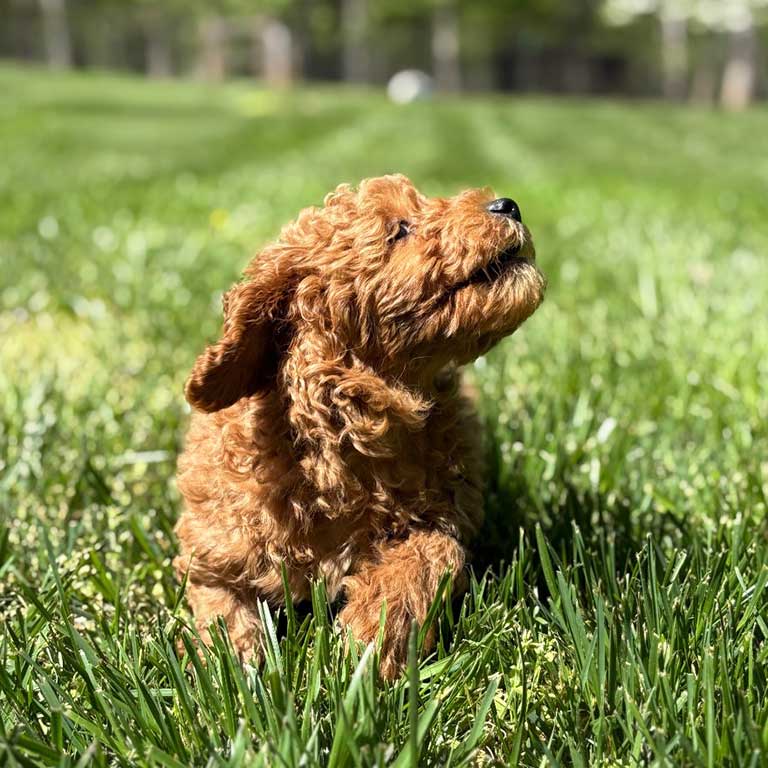 While grass eating is generally harmless, specific patterns warrant veterinary attention. As a responsible breeder committed to the lifelong health of our Cavapoos, I always advise owners to monitor their dogs’ grass-eating habits.
While grass eating is generally harmless, specific patterns warrant veterinary attention. As a responsible breeder committed to the lifelong health of our Cavapoos, I always advise owners to monitor their dogs’ grass-eating habits.
Warning signs that require professional attention:
- Excessive consumption: Grass eating that interferes with normal activities
- Sudden changes: Adult dogs with no previous interest suddenly eating grass voraciously
- Accompanying symptoms: Persistent vomiting, diarrhea, lethargy, or loss of appetite
- Compulsive behavior: Obsessive focus on grass eating that ignores food or play
- Unsafe locations: Eating grass treated with chemicals or in contaminated areas
The type and location of grass being consumed also matter significantly. Grass treated with pesticides, herbicides, or fertilizers can pose serious health risks to dogs. At Jones Farm Puppies, we maintain pesticide-free areas where our dogs can safely engage in natural behaviors.
Practical Management Strategies for Cavapoo Owners
Managing grass-eating behavior in Cavapoos requires a balanced approach that respects their natural instincts while ensuring their safety and health.
Effective management strategies include:
- Environmental management: Create designated safe areas for grass eating
- Redirection techniques: Teach “leave it” or “come” commands for behavior interruption
- Alternative fiber sources: Provide high-quality foods with adequate fiber content
- Mental stimulation: Use puzzle toys, training sessions, and interactive games
- Physical exercise: Ensure adequate daily activity to reduce boredom
- Stress reduction: Address underlying anxiety factors when applicable
For owners who prefer to minimize grass eating, redirection techniques can be highly effective. Teaching dogs to respond to commands when they approach grass allows owners to redirect their attention to more appropriate activities.
The Health Guarantee Perspective
As an ethical breeder who provides comprehensive health guarantees for our Cavapoo puppies, I want to address how grass eating relates to overall health and wellness. Regular grass-eating behavior is not considered a health defect under our health guarantee terms, as it represents typical canine behavior that occurs in healthy dogs.
Our health testing protocols include comprehensive genetic screening and health evaluations to ensure our puppies are free from underlying conditions that might contribute to abnormal eating behaviors. The clean, loving environment where we raise our puppies also contributes to their behavioral health.
We maintain open communication with puppy families and encourage them to contact us with any behavioral or health concerns. Our commitment extends beyond the initial purchase to support families throughout their Cavapoo’s lifetime.
Conclusion and Key Takeaways
Understanding why dogs eat grass empowers Cavapoo owners to respond appropriately to this common behavior while ensuring their pet’s safety and well-being. Grass eating serves multiple functions for dogs, from satisfying evolutionary instincts to meeting nutritional needs and providing psychological comfort.
Key points to remember:
- Grass eating is normal behavior in healthy dogs
- Less than 25% of dogs vomit after eating grass
- Multiple factors can motivate this behavior
- Most cases require no intervention
- Sudden changes or excessive consumption warrant veterinary attention
- Safe grass access is essential for dogs who enjoy this behavior
The key to managing grass eating successfully lies in observation, understanding, and an appropriate response. By monitoring your Cavapoo’s patterns, ensuring access to safe grass sources, and providing adequate nutrition and mental stimulation, you can support their natural behaviors while maintaining their health and safety.
At Jones Farm Puppies, we remain committed to supporting our puppy families throughout their dogs’ lives. Our ethical breeding practices, comprehensive health guarantees, and ongoing guidance help ensure that your Cavapoo develops into a healthy, happy family member who can safely enjoy natural behaviors like grass eating.
If you have specific concerns about your Cavapoo’s grass-eating behavior or any other health issues, please contact us or consult with your veterinarian. Together, we can ensure that your beloved companion enjoys a long, healthy, and fulfilling life as part of your family.
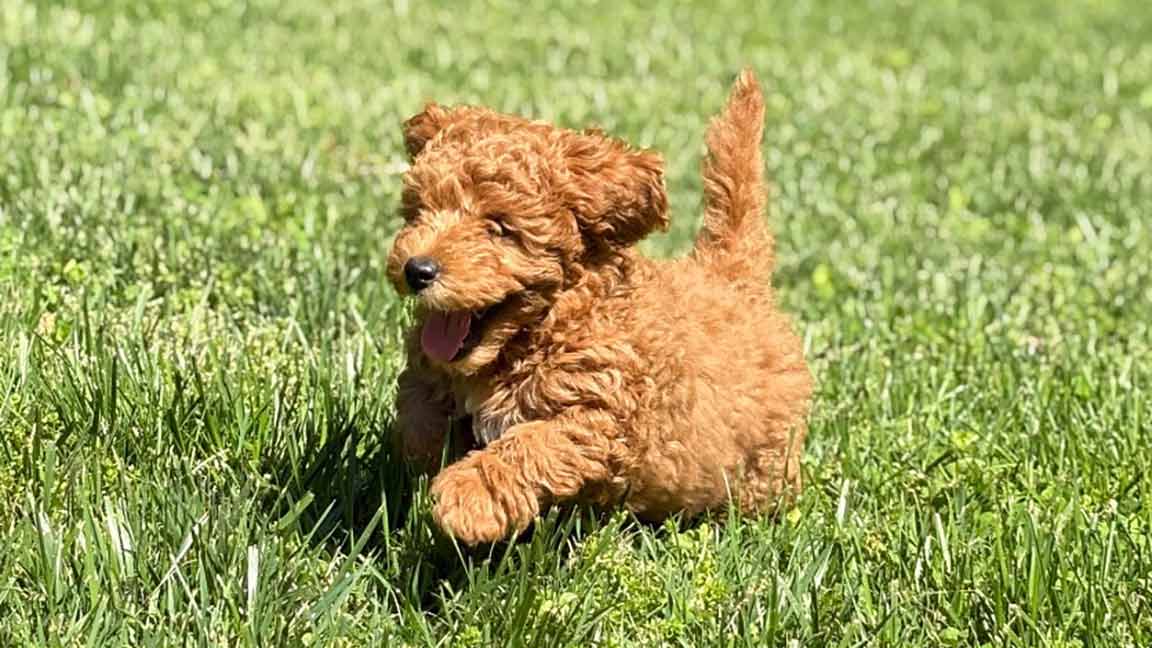
Frequently Asked Questions About Dogs Eating Grass
Is it normal for dogs to eat grass?
Yes, eating grass is entirely normal behavior for dogs. Studies show that grass eating occurs in healthy dogs across all breeds, ages, and sizes. At Jones Farm Puppies, we observe this behavior regularly in our Cavapoos, and it is considered part of their natural behavioral repertoire. Most veterinarians agree that occasional grass eating is not a cause for concern in otherwise healthy dogs.
Should I stop my dog from eating grass?
In most cases, you do not need to stop your dog from eating grass, provided the grass is safe and free from pesticides or chemicals. However, you may want to redirect this behavior if your dog is eating excessive amounts, eating grass in unsafe locations, or if other concerning symptoms accompany the behavior. Training techniques using positive reinforcement can help manage the behavior when necessary.
How much grass eating is too much?
While there is no specific amount that defines “too much,” you should be concerned if your dog becomes compulsive about eating grass or if it interferes with their everyday activities like eating, playing, or socializing. If your Cavapoo spends most of its outdoor time focused solely on eating grass or if it refuses its regular food in favor of grass, this warrants veterinary consultation.
Why does my dog eat grass and then vomit?
Contrary to popular belief, most dogs do not eat grass specifically to vomit. Research shows that less than 25% of dogs vomit after eating grass, and only 10% show signs of illness before eating grass. When vomiting does occur, it may be due to eating too much grass too quickly, eating grass on a full stomach, or consuming grass with rough textures that irritate the stomach lining.
Is grass safe for dogs to eat?
Grass itself is generally safe for dogs when it is free from pesticides, herbicides, fertilizers, and other chemicals. However, treated grass can be toxic to dogs and cause serious health problems. At Jones Farm Puppies, we maintain chemical-free areas specifically for our dogs to engage in natural behaviors safely. Always ensure your dog has access only to untreated, clean grass.
Do puppies eat grass more than adult dogs?
Puppies often show more interest in grass eating due to their natural curiosity and exploratory behavior. Young dogs investigate their environment through their mouths, making grass eating a standard part of their development. This behavior typically moderates as dogs mature, though some adult dogs continue to enjoy grass throughout their lives.
What should I do if my dog eats grass every day?
Daily grass eating is not necessarily problematic if your dog is otherwise healthy and the grass is safe. However, monitor for any changes in appetite, energy level, or digestive health. If daily grass eating is a new behavior, increases suddenly, or is accompanied by other symptoms, consult your veterinarian to rule out underlying health issues.
Does my dog need more fiber if they eat grass?
Some dogs may eat grass to supplement their fiber intake, particularly if their regular diet is low in roughage. However, high-quality dog foods typically provide adequate fiber for most dogs. If you suspect your Cavapoo needs more fiber, consult with your veterinarian about appropriate dietary adjustments rather than relying on grass consumption.
How can I provide safe grass for my dog?
To provide safe grass access, maintain a pesticide-free area in your yard, avoid areas where other animals may have defecated, choose locations away from roads and pollution sources, and consider growing a dedicated grass patch or container garden specifically for your dog. Regular lawn maintenance without chemicals ensures a safe environment for natural behaviors.
When should I call the vet about my pet eating grass?
Contact your veterinarian if your dog shows sudden changes in grass-eating behavior, eats grass compulsively or excessively, vomits frequently after eating grass, shows signs of illness alongside grass eating, or if you suspect they have consumed treated or contaminated grass. Early intervention can prevent more serious health issues.
Can I train my dog to stop eating grass?
Yes, you can train your dog to reduce or stop grass eating using positive reinforcement techniques. Teaching commands like “leave it” or “come” can help redirect your dog’s attention when they approach grass. However, consider whether training is necessary, as moderate grass eating is normal and generally harmless behavior.
Does breed affect grass-eating behavior?
While grass eating occurs across all breeds, some individual dogs may be more prone to this behavior based on their genetics, personality, or environmental factors. Cavapoos, being intelligent and curious dogs, may show interest in grass eating as part of their exploratory nature. However, breed alone does not determine whether a dog will eat grass.
